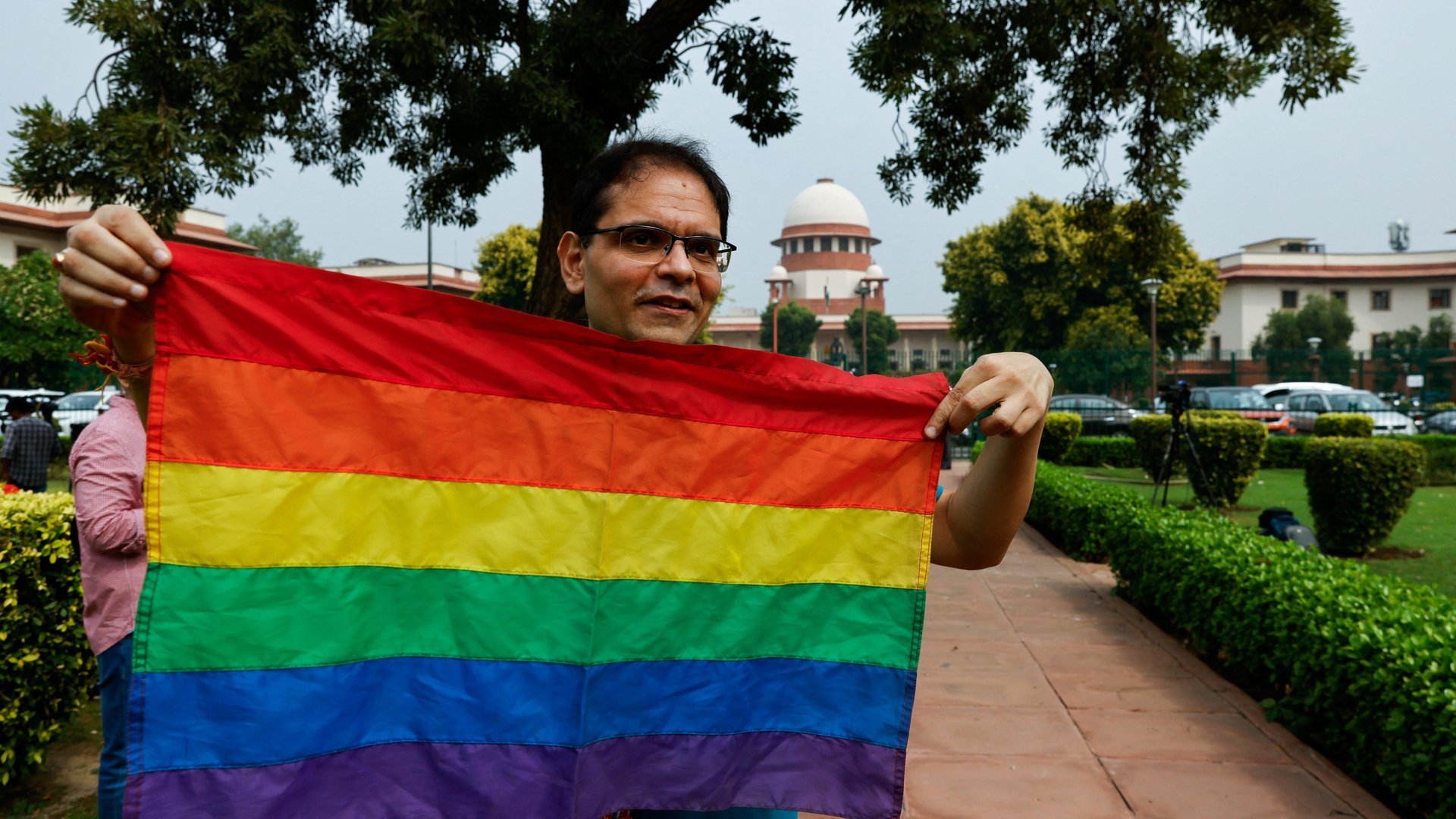The Indian Supreme Court's same-sex marriage verdict has changed nothing for queer people
Ruling 3-2 against the fundamental right to marry, the court passed the buck to the government

In a 3-2 ruling, India’s Supreme Court has ruled that the right to marry isn’t a fundamental right.
Suggested Reading
“We are in the same position as we were yesterday with respect to LGBTQ+ rights in India,” Anish Gawande, a Rhodes scholar and the founder of political accountability platform Pink List, told Quartz after the verdict.
Related Content
The apex court, which didn’t strike down or modify the 1954 Special Marriage Act or the 1969 Foreign Marriage Act, passed the buck to the legislature and the government, saying the judiciary can only implement laws, not tweak them.
The disappointing decision came five years after the court’s landmark 2018 verdict to scrap a colonial-era ban on gay sex, and mere months after the central government argued against the legalization of same-sex marriage in court.
Castigating the government’s April case that same-sex marriage is an “urban elitist concept,” equal rights activist Harish Iyer told Quartz, “I wonder how that works, though... Do people reach a plush place in Bombay and turn into same-sex lovers?”
Iyer recognizes that today (Oct. 17), “almost everyone unanimously rejected the... idea that marriage equality was an urban elite concept.” But the judges’ verdict was still insipid. “An ideal verdict would have recognized all unions between two adults as marriage,” the LGBTQIA advocate said. “The other option would have been the route of a legal contract between two people without using the word ‘marriage.’”
Quotable: Why legal marriage is important to the queer community
“Marriage bestows a bouquet of rights upon those in marriage, from insurance to bank accounts to simple benefits like spousal succession or end-of-life and medical decisions. Additionally, in a society like ours, where marriage is [sacred], it grants great respect to the relationship between two persons.”
—Tanushree Bhalla, a lawyer who advocated on behalf of same-sex marriage petitioners in court this April, to Quartz on Oct. 17
More rights for queer people coming soon... but when?
While two judges advocated for queer people’s legal right to form a civil union, giving them the right to be in a relationship, the right to cohabit, the right to adopt, and more, the majority opinion dissented. Even for a civil union, the ball was tossed out of the literal court and into the metaphorical court of the legislature or the executive.
The Supreme Court panel made some notable observations around the need to protect queer people—from discrimination, from harassment, from police persecution that forces people to return to natal families, and from medical procedures like hormone therapy that are used in outlawed conversion practices. It also made a clarion call for setting up a committee to define and implement these changes.
However, the edict didn’t provide any guidelines for how and when such protections would take effect.
“We have the promise of a committee that has no clarity on its composition, on its timeframe, or on its locus of authority, which means we have no clarity on when exactly these rights can be extended to queer people,” Gawande said.
If the ruling Bharatiya Janata Party (BJP) wins a critical role on such a committee, LGBTQIA+ community may still face an uphill battle. Homosexual relations date back many hundreds of years in India—temple carvings from the ninth century in Khajurao, Madhya Pradesh, depict them—but the current government says same-sex marriages will wreak “complete havoc with the delicate balance of personal laws.”
There’s a flip-side to that argument, though. What about denying the homosexual community the right to insurance, or visitation rights for a sick partner in hospital?
“The Indian government should ensure that same-sex couples have legal recognition, equal rights to private and family life, and have access to all social protection measures and benefits traditionally offered to heterosexual married couples, without discrimination,” Graeme Reid, director of Human Rights Watch’s lesbian, gay, bisexual, and transgender rights program, said in an emailed statement.
Trans people’s marriages are valid—but there’s a catch
India, which in 2014 established a third, neutral gender in a win for trans rights—but then distorted those rights in a 2019 bill—offered the community some clarity on marriages. Trans people in a “heterosexual” marriage are compliant with the law, the five-judge panel said.
A non-exhaustive list of ways to seek LGBTQ+ liberation outside the court
“It’s a sobering day which has made it abundantly clear courts cannot and should not be the only recourse to the question of LGBTQ+ rights,” Gawande told Quartz. As alternative paths, the activist encourages:
🏛️ More substantial and sustainable engagement with India’s political class to translate the “social and cultural capital of queer community into political capital” that can be used to negotiate with governments at the local, state, and national level
🤝 Building solidarity with other marginalized communities and allies to “present a charter of demands that’s more likely to be accepted than individual demands”
One more thing: India’s Supreme Court denied a woman an abortion
A three-judge Supreme Court panel denied a petition by a 27-year-old married woman suffering from postpartum psychosis to terminate her 26-week pregnancy. (The legal limit is 24 weeks.)
The court declared that the baby is healthy and therefore must be born. Then the parents can give the child up for adoption if they want.
“A foetus has outranked a woman’s autonomy, health, life,” Saumya Kalia, a staff writer for daily newspaper The Hindu, posted on X yesterday (Oct. 16). “But please, raise your ‘nari shakti’ slogans and wax on about how empowered Indian women are.”
